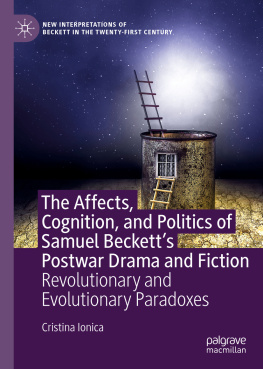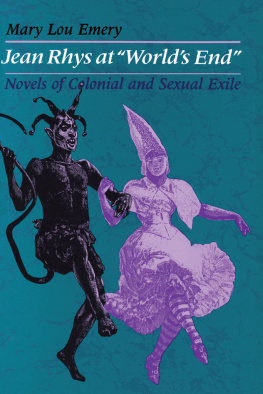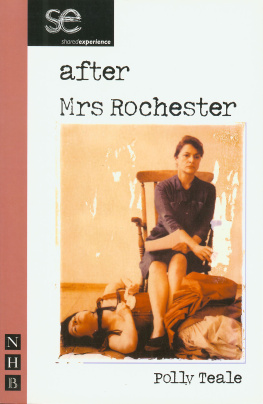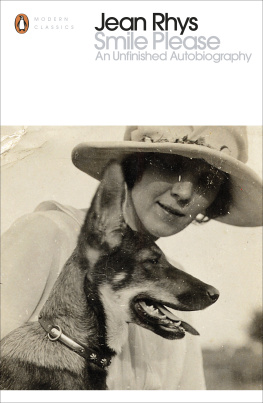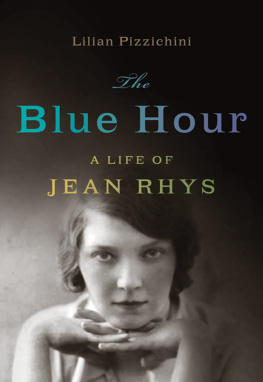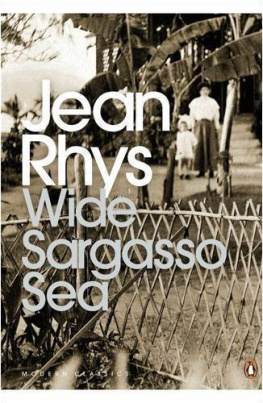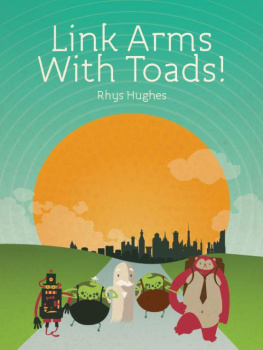Cristina-Georgiana Voicu
Exploring Cultural Identities in Jean Rhys Fiction
Cristina-Georgiana Voicu
Exploring Cultural
Identities in Jean
Rhys Fiction
Mana ging Editor: Katarzyna Grzegorek
Associate Editor: Anna Borowska
Published by De Gruyter Open Ltd, Warsaw/Berlin
This work is licensed under the Creative Commons Attribution-NonCommercial-NoDerivs 3.0 license, which means that the text may be used for non-commercial purposes, provided credit is given to the author. For details go to http://creativecommons.org/licenses/by-nc-nd/3.0/.
Copyright 2014 Cristina-Georgiana Voicu
ISBN (paperback): 978-83-7656-066-3
ISBN (hardcover): 978-83-7656-067-0
e-ISBN: 978-31-1036-812-3
Managing Editor: Katarzyna Grzegorek
Associate Editor: Anna Borowska
www.degruyteropen.com
Cover illustration: IStock/ cdwheatley
With pro found love to my family for all their support and encouragement Cu profund dragoste familiei mele pentru susinere i ncurajare
There is always the other side, always.
Jean Rhys, Wide Sargasso Sea
Contents
Acknowledgments
This book could not have been completed and become reality without the patience, dedication and expertise in British and American Studies of several persons.
I would first like to express my deepest gratitude to Professor Dr. Odette Blumenfeld and Professor Dr. Sorin Prvu from Alexandru Ioan Cuza University of Iai, Faculty of Letters, English Department, for all their guidance and assistance during the writing and research process of this book.
I am also extremely grateful to everyone at the University of Graz (Austria), Center for the Study of the Americas, especially to Professor Dr. Ulla Kriebernegg, for encouraging me to do this academic research.
There was a wonderful opportunity to meet Professor Dr. Gary Francisco Keller from Arizona State University during my research stays in Graz who continued to guide me through the Caribbean and Latin-American universe.
My appreciation also goes to Erienne Rojas for her support and help in editing my manuscript.
I am also indebted to my sister, Researcher Dr. Amalia Voicu who encouraged, perhaps unknowingly, my love of, and obstinate belief in conceptual thinking.
My greatest thanks, however, go to my parents, Mihai and Melania Voicu for their unfailingly loving support, for sustaining me in my research and for keeping me company up to the very last frantic minute.
Foreword
Exploring Cultural Identities in Jean Rhys Fiction exposes my interest in hybridity, a concept within the larger one of cultural identity, alluding to the mixture, combination, fusion, mlange especially generated by the processes of migration. It is a long journey through different genres, continents, cultures, critical approaches and mentalities and a joint result of several important factors.
Exploring Cultural Identities in Jean Rhys Fiction is a study on the Caribbean and Caribbean literature, and Rhys writings in particular, thus addressing various kinds of readership. According to the metaphor of mlange, cultures are present as flowing together like body fluids, hence the existence of a fluid identity. Starting from the acknowledgment that (cultural) hybridity is paradoxical in its essence and that only an ambivalent attitude is able to encompass its contradictory wholeness, the book reveals the concepts of racial identity, ethnicity or masculinity that contribute to the reinvigoration of the aspects specific to Caribbean culture as described in the work of Jean Rhys.
In the context of the above, my endeavor in writing this book is concentrated on the study of the identitarian phenomenon. Consequently, Jean Rhys use of the 1st person pronoun marks the point in which the pre-existing and repeatable language system articulates with the existence of the self as a unique and unrepeatable person in a specific social and historical situation. In other words, the act of creating the self is not an option in her case, but an obligation. This is only natural since we have to create ourselves; Bakhtin argues our self does not have an alibi in existence, so the self is not given to us.
As far as the opportunity of the chosen topic is concerned, I can state that at the level of content, this book aims at constituting a theoretical framework circumscribed to the concept of cultural hybridization within postcolonial experience and the analysis of certain situations of existential ambivalence that operate at the boundary between sign (colonial difference) and symbol (imperial authority). Thus, bringing forward issues related not only to cultural identity, but also to alterity, racism and colonialism in the context of transcending cultural limits. At a methodological level, the topic brings together two reputed fields: the area of postcolonial literature (addressing mainly identitarian concerns) and the field of cultural practices, in an integrated critical research that combines cultural studies with textual analysis. Consequently, by applying the theory of cultural hybridity as a mirroring-space of identitarian dynamics in Jean Rhys work, I have the opportunity to prove that postcolonial identity necessarily becomes a hybrid between two cultures, founded on destruction through adaptation hence the tetrad: take over, adaptation, promotion and development. Colonizers destroyed, annihilated, and yet took viable elements from the former culture.
The idea that postcolonial culture is in fact a hybrid culture derives from the notion of deterritorialization, in the sense that we witness an ever-intense traffic between cultures a consequence of colonization accompanied by a mlange of uprooted , p. 97). Thus, from the point of view of cultural experience, what becomes important to my critical discourse is the way in which this widening of social relations affects the character of the real place. Hence, the duality of the cultural settings in Jean Rhys fiction by which the characters usually move about; on the one hand, familiar aspects, i.e. the protagonists stay at home and on the other hand, the alien features rather placed in that place by distant forces. In this sense, the experience of dis-location in postcolonial society is not an alienating experience, but an experience of cultural identity ambivalence.
Coming back to the concept of hybridity, the book refers to a space between two pure areas. On the other hand, though, it is a sine qua non of human cultures that does not contain purity zones; as is the case with transculturality processes (mutual borrowings between cultures). Moreover, the notion of hybrid culture can prove useful in understanding the type of cultural identity that comes to the fore in the transnational cultural space. Consequently, I have undertaken an analysis of the hybrid seen as metaphor and correlated with the exploration of cultural changes suggested by the notion of deterritorialization. This perspective stresses the alienating, individualizing and contractual aspects found in close relation, not with a real space but rather with an anthropological one: a space that cannot be defined as relational, historical or concerned with identity [], a non-place (, p.63). Consequently, the concept of deterritorialization encapsulates the idea of place transformation with both positive and negative features, yet resisting the temptation of interpreting it as a simple impoverishment or dissolution of cultural interaction. Thus of interest for the topic of this book is an investigation of the intrinsic ambivalence of deterritorialization; when applied to the life experience of the characters in Jean Rhys works, wherein becoming naturalized is taken as such in the current flow of experience.




